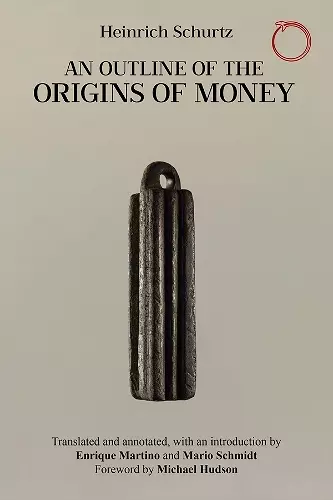An Outline of the Origins of Money
Heinrich Schurtz author Mario Schmidt editor Enrique Martino editor
Format:Paperback
Publisher:HAU Society Of Ethnographic Theory
Published:25th Dec '24
Should be back in stock very soon

A new English translation of a forgotten German text that influenced cultural understanding of money in the early twentieth century.
“On this subject, I only knew the excellent little book by the late Schurtz”—Marcel Mauss, 1914, Les origines de la notion de monnaie.
Heinrich Schurtz’s 1898 book has been a touchstone for economic historians, anthropologists, and philosophers interested in the nature and origins of money in various societies, including Georg Simmel, Max Weber, Marcel Mauss, and Karl Polanyi. In his brief book, Schurtz experimented with concepts about money, going beyond traditional economic paradigms. Drawing on an extensive range of archaeological and ethnographic sources, he reframed a theory of money to include its materiality, symbolic nature, relationship to forms of property, and its dual origin in “outside money” and “inside money.” While it is not well known today, it was important to the theorization of money in the first half of the 20th century and its innovative synthesis offers galvanizing questions and insights into how value relations are formed and how currency systems are interrelated.
"A classic to reflect on the meaning not only of money, but more generally of the concept of wealth, written by an ethnologist at the end of the nineteenth century. The author attributes multiple roles to money, far beyond that of a mere unit of account or a means to facilitate exchanges. The book helps investors to reflect on issues that are too often assumed to be immutable elements of our society, but also to understand the ongoing transition, in which new forms of money will play a primary role." * bluerating *
"Schurtz’s book remains a valuable testimony to how economic anthropology can challenge the intellectual arrogance of certain types of economic theory." * The Journal of European Economic History *
"What does Heinrich Schurtz have to say? Money is not just, or even primarily, a means of facilitating exchange. Heinrich Schurtz finds its origin - and paradigm - in the aesthetic radiance that certain ornaments exert on human minds, arousing 'the envy of fellows and the admiration of women'; what he calls 'inside money'. By meeting the needs of commerce, this primary social power is transmuted into purchasing power, giving rise to the money we know. We must thank Enrique Martino and Mario Schmidt for placing these valuable reflections in our hands." * André Orléan, author of The Empire of Value: A New Foundation for Economics, “The Origin of Money” and “Value and Money as Social Power” *
"Heinrich Schurtz’s Outlines of the Origin of Money brings to light the brilliance of an intellectual journey cut short. This work positions Schurtz as a 'minor classic,' comparable to Marcel Mauss, and more than a historical curiosity for specialists only. Unrecognized yet subliminally influential, Schurtz straddles the line between the greats like Weber and Simmel and the era-specific figures such as Bücher and Sombart." * Jürgen Osterhammel, author of The Transformation of the World: A Global History of the Nineteenth Century, and co-editor of Max Weber and His Contemporaries *
"Around the world in eighty currencies. Schurtz's book is a pioneering contribution to define the concept of money in the horizon of global culture. A passionate ethnographic campaign to discover the economic customs of humankind, in its historical evolution, among the most diverse cultures, in the extraordinary polymorphism of the media of currencies." * Carlotta Santini, author of “Friedrich Nietzsche in Basel: An Apology for Classical Studies” and “Can Humanity be Mapped? Adolf Bastian, Friedrich Ratzel and the Cartography of Culture” *
"What are the origins of money? According to Heinrich Schurtz, only Indigenous peoples have an answer to this question. Thereby, he brings his readers through a journey into the material forms and social uses of money across the globe. With this translation, a hidden gem will become a classic for scholars interested in how money is made, accepted, and transformed by people daily using it." * Karin Pallaver, editor of Monetary Transitions: Currencies, Colonialism and African Societies and co-author, together with Jane Guyer, of “Money and Currency in African history” *
ISBN: 9781914363078
Dimensions: 229mm x 152mm x 23mm
Weight: 513g
274 pages